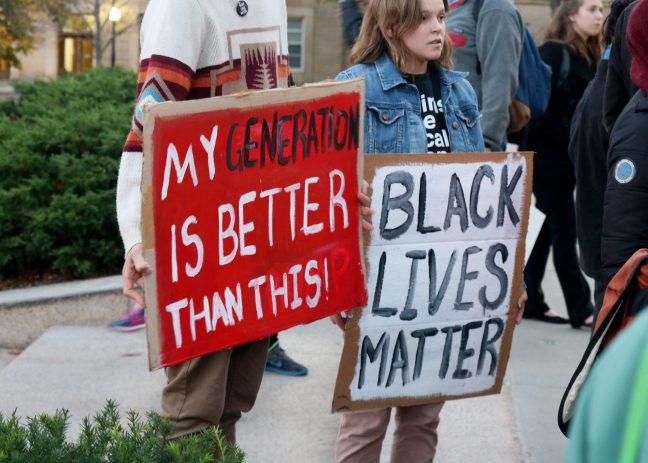With the hopes of educating the community on why dismantling racism is central to democracy, the University of Wisconsin hosted community activist Jamala Rogers for a lecture on current racial disparities and how to approach solving them.
At the Tuesday event presented by the UW Havens Center for Social Justice, Rogers said she aimed to have an energetic and robust conversation about her work and the current state of racial affairs.
Rogers currently serves as the Activist-in-Residence at the Havens Center. According to its website, the center is dedicated to “promoting critical intellectual reflection and exchange, both within the academy as well as between it and the broader society.”
Rogers helped found the St. Louis chapter of the Congress of African People and the Organization for Black Struggle. She has contributed to the African Liberation Support Committee, the National Black Political Assembly and the Coalition Against Police Crimes and Repression.
In 2015, she published “Ferguson Is America: Roots of Rebellion,” a book focused on the struggle to attain human rights and social justice in St. Louis.
Roger kicked of the lecture by breaking down Dane County’s Race to Equity Report, which outlines some of the major disparities between white and black citizens in the county.
“Indicators of quality of life are part of any democracy,” she said.
Some of the data highlighted includes a finding that black students in Dane County public schools are 15 times more likely to be suspended than white students. In addition, Dane County had a 4.8 percent unemployment rate for white people and 25 percent for black people in 2011.
Rogers also said the Census Bureau’s American Community Survey found 54 percent of black people in Dane County live below the federal poverty line, compared to 8.7 percent of white people. She provided a definition for racism because sometimes, she said, “people conflate individual acts of prejudice with racism.”
Racism is the belief a race is superior to others and holds the power to promote and enforce those beliefs through a system of educational, financial, social, religious, cultural and political institutions, Rogers said.
Referring to its Greek origin, she also defined democracy.
“Dēmos is people and kratia means power … That’s such a beautiful word,” she said.
Members of the audience stated their concerns and offered solutions to reduce racial disparities after the lecture. The issues discussed ranged from the influence of class struggles on racism to the inequity within university departments, both in terms of students and faculty.
Following a comment regarding the pressure of tackling racial disparities as a white person, both in work and private life, Rogers said ultimately, white people must discover how to root out the internalized racism to fully dismantle racial inequity.
“The discomfort that people are going to feel is going to be real, but nothing compared to the daily life of [African Americans],” Rogers said.


